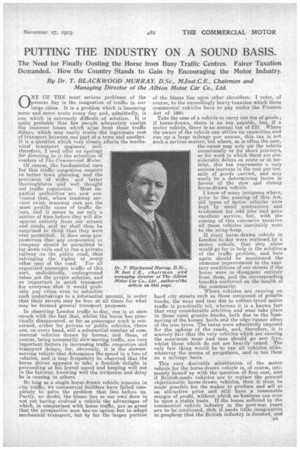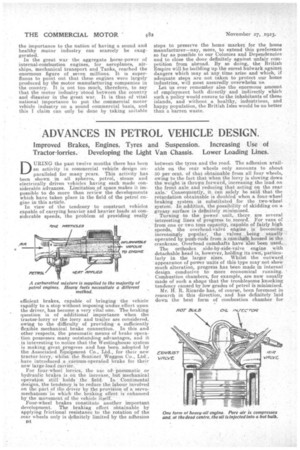PUTTING THE INDUSTRY ON A SOUND BASIS.
Page 7

Page 8

If you've noticed an error in this article please click here to report it so we can fix it.
The Need for Finally Ousting the Horse from Busy Traffic Centres. Fairer Taxation Demanded. How the Country Stands to Gain by Encouraging the Motor Industry,
By Dr. T. BLACK WOOD MURRAY, D.Sc., M.Inst.C.E., Chairman and Managing Director of the Albion Motor Car Co., Ltd.
0 NE OF THE most serious problems of the present day is the congestion of traffic in our large cities. It is a problem which is becoming more and more acute every day and, admittedly, is one which is extremely difficult of solution. It is quite probable that few people adequately realize the immense losses which arise from these traffic delays, which may easily treble the; legitimate cost of transport between one part of a town and another. It is a question which very closely affects the mechanical transport engineer, and, therefore, I. need offer no apology for directing to it the attention of readers of The Commercial Motor.
Of course, the fundamental cure for this traffic congestion consists in better town planning, and the provision of wider and better thoroughfares and well thought out traffic regulation. Most impartial authorities are now convinced that-, where tramway services exist, tramway cars are the most prolific cause of -traffic delays, and it seems to me only a matter of time before they will disappear entirely from our streets and roads, and we shall then be surprised to think that they were ever permitted._ It does seem preposterous that any corporation or company should be permitted to lay down rails and to run a private railway on the ptiblic road, thus infringing the rights of every other user of the road. For all organized passenger traffic of this sort, undoubtedly, underground tubes are the proper solution, and so important is quick transport for everyone that it would probably pay cities even to subsidize such undertakings to a substantial amount, in order that their streets may be free at all times for what may be termed general transport purposes.
In observing London traffic to-day, one is at once struck with the fact that, whilst the horse has practically disappeared, so far as passenger work is concerned, either for private or public vehicles, there are, on every hand, still a substantial number of commercial vehicles drawn by horses, and these, of course, being necessarily slow-moving traffic, are very important factors in increasing traffic congestion and transport delays, for, obviously, it is the slowestmoving vehicle that determines the speed in a line of vehicles, and it may frequently be observed that the horse driver appears to take a fiendish delight in proceeding at his lowest speed and keeping well out in the fairway, knowing well the irritation and delay he is causing to others.
So long as a single horse-drawn vehicle remains in city traffic, we commercial builders have failed completely to solve the problem that lies before us. Partly, no doubt, the blame lies at our own door in not yet having evolved a vehicle the advantages of which, in comparison with horse traffic, are 90 great that the prospective user has no option but to adopt mechanical transport, but by far the larger portion
of the blame lies upon other shoulders. I refer, of course, to the exceedingly heavy taxation which these commercial vehicles have to pay under the Finance Act of 1920.
Take the case of a vehiele to carry one ton of goods ; if horse-drawn, there is no tax payable, but, if a motor vehicle there is an annual tax of 221. here the owner of I *here the vehicle can utilize its capacities and run up a large mileage per annum, this tax is not such a serious matter, but where, as is often the case, the owner may only use the vehicle occasionally or for short journeys, or for work in which there are considerable delays en route or at termini, this tax represents a very serious increase in the cost per tonmile of goods carried, and may easily be a determining factor in favour of the slow and clumsy horse-drawn vehicle.
I know of many instances where, prior to the passing of this Act, old types of motor vehicles were kept by small contractors and tradesmen for odd jobs and gave excellent service, but, with the coming of this excessive taxation all these vehicles inevitably went to the scrap-heap.
If every horse-drawn vehicle in London to-day were replaced by a motor vehicle, that step alone would go far to help in the solution of the traffic problem, and here again should be mentioned the immense improvement in the sanitary conditions of our streets if the horse were to -disappear entirely from them, and the corresponding benefits conferred on the health of the community.
Where vehicles are running on hard city streets such as those composed of granite blocks, the wear and tear due to rubber-tyred motor traffic is practically nil, whereas it is a known fact that very considerable attrition and wear take place in these same granite blocks, both due to the hammering of the horses' hoofs and the edge-runner effect of the iron tyres. The taxes were admittedly imposed for the upkeep of the, roads. and, therefore, it is scarcely fair that the very vehicles which are causing the maximum wear and tear should go scot free, whilst those which do not are heavily taxed. The only fair thing would be to tax all vehicles alike, whatever the means of propulsion, and to tax them on a mileage basis.
This very desirable substitution of the motor vehicle for the horse-drawn vehicle is, of course, intimately bound up with the question of first cost, and if British-made vehicles are to replace the present objectionable horse-drawn vehicles, then it must be made possible for the maker to produce and sell at an attractive price and still have a reasonable margin of profit, without which no business can ever be upon a stable basis. If the losses suffered by the commercial vehicle industry in the post-war years are to be continued, theb it. needs little imagination to prophesy that theBritish industry is doomed, and
the importance to the nation of having a sound and healthy motor industry can scarcely be exaggerated.
In the great war the aggregate horse-power of internal-combustion engines, for aeroplanes, airships, mechanical transport and Tanks, reached the enormous figure of seven millions. It is superfluous to point out that these engines were largely produced by the motor manufacturing companies in the country. It is not too much, therefore, to say that the motor industry 'stood between the country and disaster in the great war. It is thus .of vital national importance to put the commercial motor vehicle industry on a sound commercial basis, and this I claim can only be done by taking suitable
steps to preserve the home market for the home manufacturer—nay, more, to extend this preference so far as possible to our Colonies and Dependencies and to close the door definitely against unfair competition from abroad. By so doing, the British Empire will be building up the surest bulwark against dangers which may at any time arise and which, if adequate steps are not taken to protect our home industries, will most assuredly overwhelm Us.
Let us ever remember also the enormous amount of employment both directly and indirectly which such a policy would ensure to the inhabitants of these islands, and without a healthy, industrious, and happy population, the British Isles would be no better than a barren waste.








































































